初三英语中考专题复习代词数词
- 格式:doc
- 大小:29.50 KB
- 文档页数:2
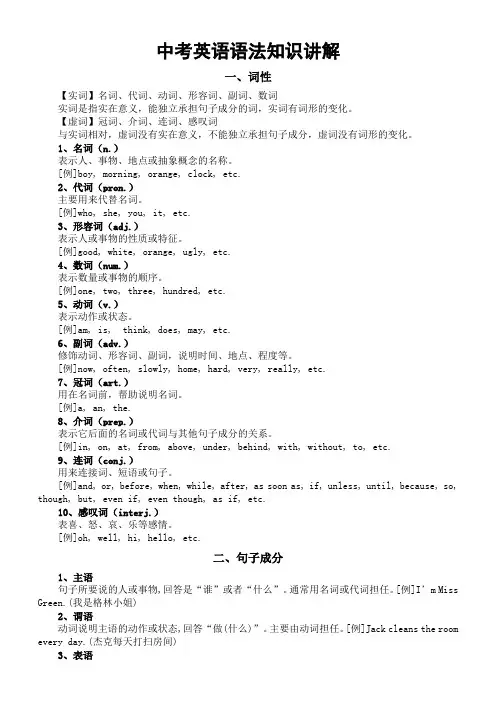
中考英语语法知识讲解一、词性【实词】名词、代词、动词、形容词、副词、数词实词是指实在意义,能独立承担句子成分的词,实词有词形的变化。
【虚词】冠词、介词、连词、感叹词与实词相对,虚词没有实在意义,不能独立承担句子成分,虚词没有词形的变化。
1、名词(n.)表示人、事物、地点或抽象概念的名称。
[例]boy, morning, orange, clock, etc.2、代词(pron.)主要用来代替名词。
[例]who, she, you, it, etc.3、形容词(adj.)表示人或事物的性质或特征。
[例]good, white, orange, ugly, etc.4、数词(num.)表示数量或事物的顺序。
[例]one, two, three, hundred, etc.5、动词(v.)表示动作或状态。
[例]am, is, think, does, may, etc.6、副词(adv.)修饰动词、形容词、副词,说明时间、地点、程度等。
[例]now, often, slowly, home, hard, very, really, etc.7、冠词(art.)用在名词前,帮助说明名词。
[例]a, an, the.8、介词(prep.)表示它后面的名词或代词与其他句子成分的关系。
[例]in, on, at, from, above, under, behind, with, without, to, etc.9、连词(conj.)用来连接词、短语或句子。
[例]and, or, before, when, while, after, as soon as, if, unless, until, because, so, though, but, even if, even though, as if, etc.10、感叹词(interj.)表喜、怒、哀、乐等感情。
[例]oh, well, hi, hello, etc.二、句子成分1、主语句子所要说的人或事物,回答是“谁”或者“什么”。
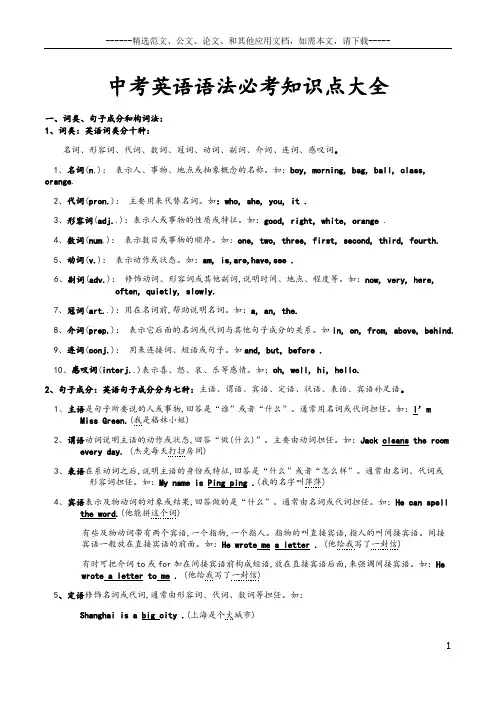
中考英语语法必考知识点大全一、词类、句子成分和构词法:1、词类:英语词类分十种:名词、形容词、代词、数词、冠词、动词、副词、介词、连词、感叹词。
1、名词(n.):表示人、事物、地点或抽象概念的名称。
如:boy, morning, bag, ball, class, orange.2、代词(pron.):主要用来代替名词。
如:who, she, you, it .3、形容词(adj..):表示人或事物的性质或特征。
如:good, right, white, orange .4、数词(num.):表示数目或事物的顺序。
如:one, two, three, first, second, third, fourth.5、动词(v.):表示动作或状态。
如:am, is,are,have,see .6、副词(adv.):修饰动词、形容词或其他副词,说明时间、地点、程度等。
如:now, very, here,often, quietly, slowly.7、冠词(art..):用在名词前,帮助说明名词。
如:a, an, the.8、介词(prep.):表示它后面的名词或代词与其他句子成分的关系。
如in, on, from, above, behind.9、连词(conj.):用来连接词、短语或句子。
如and, but, before .10、感叹词(interj..)表示喜、怒、哀、乐等感情。
如:oh, well, hi, hello.2、句子成分:英语句子成分分为七种:主语、谓语、宾语、定语、状语、表语、宾语补足语。
1、主语是句子所要说的人或事物,回答是“谁”或者“什么”。
通常用名词或代词担任。
如:I’mMiss Green.(我是格林小姐)2、谓语动词说明主语的动作或状态,回答“做(什么)”。
主要由动词担任。
如:Jack cleans the roomevery day. (杰克每天打扫房间)3、表语在系动词之后,说明主语的身份或特征,回答是“什么”或者“怎么样”。
![最新初中中考英语总复习语法大全[可打印]](https://uimg.taocdn.com/7799717f43323968011c92bb.webp)
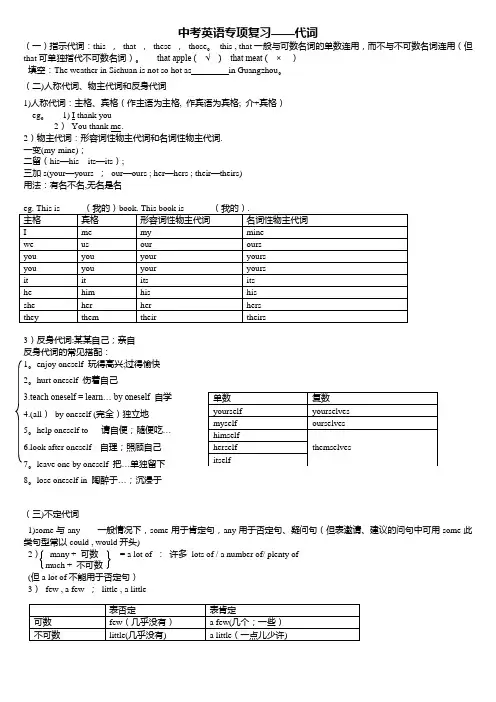
中考英语专项复习——代词(一)指示代词:this , that , these , those 。
this , that 一般与可数名词的单数连用,而不与不可数名词连用(但that 可单独指代不可数名词)。
that apple ( √ ) that meat ( × )填空:The weather in Sichuan is not so hot as __ in Guangzhou 。
(二)人称代词、物主代词和反身代词1)人称代词:主格、宾格(作主语为主格, 作宾语为宾格; 介+宾格)eg 。
1) I thank you2) You thank me.2)物主代词:形容词性物主代词和名词性物主代词.一变(my-mine);二留(his —his its —its );三加s(your —yours ; our —ours ; her —hers ; their —theirs)用法:有名不名,无名是名3)反身代词:某某自己;亲自反身代词的常见搭配:1。
enjoy oneself 玩得高兴;过得愉快2。
hurt oneself 伤着自己3.teach oneself = learn… by oneself 自学4.(all ) by oneself (完全)独立地5。
help oneself to 请自便;随便吃…6.look after oneself 自理;照顾自己7。
leave one by oneself 把…单独留下8。
lose oneself in 陶醉于…;沉浸于(三)不定代词1)some与any一般情况下,some 用于肯定句,any 用于否定句、疑问句(但表邀请、建议的问句中可用some-此类句型常以could , would 开头)2) many + 可数 = a lot of : 许多 lots of / a number of/ plenty ofmuch + 不可数(但a lot of 不能用于否定句)3) few , a few ; little , a little①。
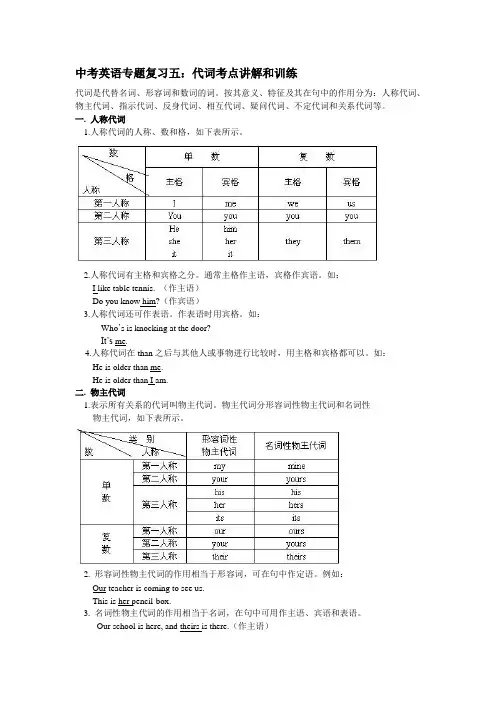
中考英语专题复习五:代词考点讲解和训练代词是代替名词、形容词和数词的词。
按其意义、特征及其在句中的作用分为:人称代词、物主代词、指示代词、反身代词、相互代词、疑问代词、不定代词和关系代词等。
一. 人称代词1.人称代词的人称、数和格,如下表所示。
2.人称代词有主格和宾格之分。
通常主格作主语,宾格作宾语。
如:I like table tennis. (作主语)Do you know him?(作宾语)3.人称代词还可作表语。
作表语时用宾格。
如:---Who’s is knocking at the door?---It’s me.4.人称代词在than之后与其他人或事物进行比较时,用主格和宾格都可以。
如:He is older than me.He is older than I am.二. 物主代词1.表示所有关系的代词叫物主代词。
物主代词分形容词性物主代词和名词性物主代词,如下表所示。
2. 形容词性物主代词的作用相当于形容词,可在句中作定语。
例如:Our teacher is coming to see us.This is her pencil-box.3. 名词性物主代词的作用相当于名词,在句中可用作主语、宾语和表语。
Our school is here, and theirs is there.(作主语)--- Is this English-book yours? (作表语)--- No. Mine is in my bag.I've already finished my homework. Have you finished yours? (作宾语)三. 指示代词指示代词包括:this,that,these,those。
1. this和these一般用来指在时间或空间上较近的事物或人,that和those则指时间和空间上较远的事物或人,例如:This is a pen and that is a pencil.In those days the workers had a hard time.2. 有时that和those指前面讲到过的事物,this 和these则是指下面将要讲到的事物,I had a cold. That's why I didn't come.What I want to say is this ; pronunciation is very important in learning English.3. 有时为了避免重复提到的名词,常可用that或those代替,例如:Television sets made in Beijing are just as good as those made in Shanghai.4. this 在电话用语中代表自己,that 则代表对方。
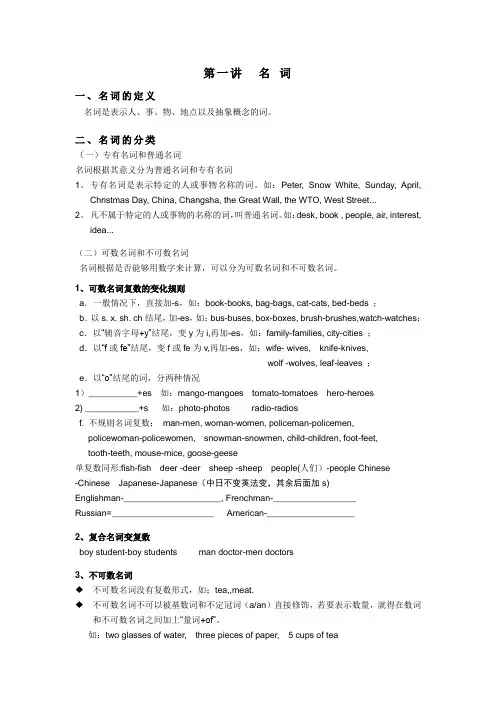
第一讲名词一、名词的定义名词是表示人、事、物、地点以及抽象概念的词。
二、名词的分类(一)专有名词和普通名词名词根据其意义分为普通名词和专有名词1、专有名词是表示特定的人或事物名称的词。
如:Peter, Snow White, Sunday, April,Christmas Day, China, Changsha, the Great Wall, the WTO, West Street...2、凡不属于特定的人或事物的名称的词,叫普通名词。
如:desk, book , people, air, interest,idea...(二)可数名词和不可数名词名词根据是否能够用数字来计算,可以分为可数名词和不可数名词。
1、可数名词复数的变化规则a.一般情况下,直接加-s,如:book-books, bag-bags, cat-cats, bed-beds ;b.以s. x. sh. ch结尾,加-es,如:bus-buses, box-boxes, brush-brushes,watch-watches;c.以“辅音字母+y”结尾,变y为i,再加-es,如:family-families, city-cities ;d.以“f或fe”结尾,变f或fe为v,再加-es,如:wife- wives, knife-knives,wolf -wolves, leaf-leaves ;e.以“o”结尾的词,分两种情况1)__________+es 如:mango-mangoes tomato-tomatoes hero-heroes2) ___________+s 如:photo-photos radio-radiosf. 不规则名词复数:man-men, woman-women, policeman-policemen,policewoman-policewomen, snowman-snowmen, child-children, foot-feet,tooth-teeth, mouse-mice, goose-geese单复数同形:fish-fish deer -deer sheep -sheep people(人们)-people Chinese-Chinese Japanese-Japanese(中日不变英法变,其余后面加s)Englishman-____________________, Frenchman-_________________Russian=_____________________ American-__________________2、复合名词变复数boy student-boy students man doctor-men doctors3、不可数名词◆不可数名词没有复数形式,如:tea,,meat.◆不可数名词不可以被基数词和不定冠词(a/an)直接修饰,若要表示数量,就得在数词和不可数名词之间加上“量词+of”。
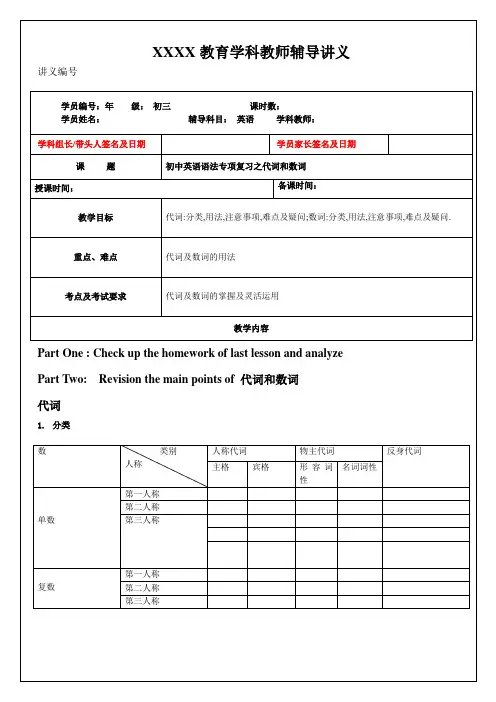
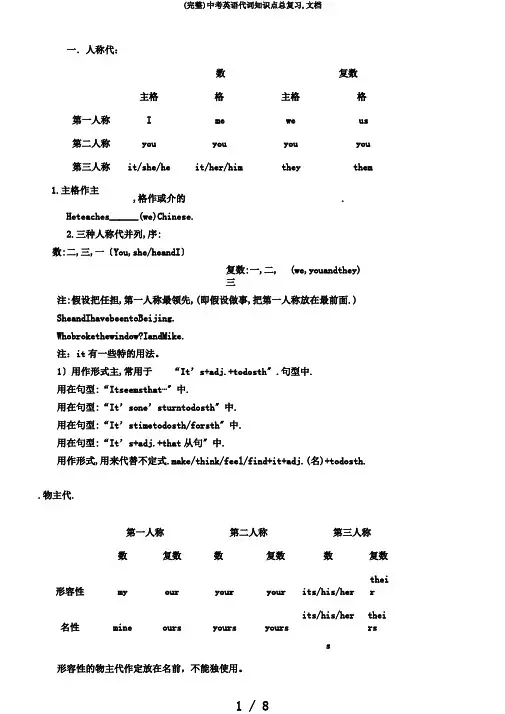
一.人称代:数复数主格格主格格第一人称I me we us第二人称you you you you第三人称it/she/he it/her/him they them1.主格作主,格作或介的.Heteaches______(we)Chinese.2.三种人称代并列,序:数:二,三,一〔You,she/heandI〕复数:一,二,三(we,youandthey) 注:假设把任担,第一人称最领先,(即假设做事,把第一人称放在最前面.)SheandIhavebeentoBeijing.Whobrokethewindow?IandMike.注:it有一些特的用法。
1〕用作形式主,常用于“It’s+adj.+todosth〞.句型中.用在句型:“Itseemsthat⋯〞中.用在句型:“It’sone’sturntodosth〞中.用在句型:“It’stimetodosth/forsth〞中.用在句型:“It’s+adj.+that从句〞中.用作形式,用来代替不定式.make/think/feel/find+it+adj.(名)+todosth..物主代.第一人称第二人称第三人称数复数数复数数复数形容性my our your your its/his/her thei r名性mine ours yours yours its/his/her theirss形容性的物主代作定放在名前,不能独使用。
名性的物主代,后面不能加名。
名性的物主代常与of用。
Ourclassroomisasbigas______(they).Thisisafriendof______(my).注:1)名性的物主代相当于形容性的物主代加一个名.〔名性的物主代=形容性的物主代+名〕2)形容性的物主代与own用,后面可跟名也可不跟名 .Myownhouse=ahouseofmyown三.反身代数复数第一人称myself ourselves第二人称yourself yourselves第三人称himself/herself/itself themselves 小:反身代有律,第三人称格加self.其余都要物主加s elf,复数ves来把f替.反身代的常用搭配:enjoyoneself hurtoneself teachoneself =learn⋯byoneself allbyoneself helponeselfto⋯lookafteroneselfleavesb.byoneself saytooneself foroneselfdressoneself improveoneself seeoneselfinthemirror四.指示代1.近指:thisthese指:that those2.用法:1)thatthose 常用来代替前面出的人或物,以防止重复.That代替可数名的数或不可数名.Those代替复数名.TheweatherinGuangdongishotterthan_____inQinghai.Thebooksinthatshoparecheaperthan______inthisshop.A.thisB.thatC.oneD.those2)this,that可代替句子或句子的一个局部,that代替前面提到的句子而this代替下面提到的句子.Hehadabad cold,thatiswhyhedidn’tcome.3)在用中,this代替自己,而that代替方.ThisisTomspeaking. Whoisthat?.不定代的区.与it的区One代替同事物中的一种.而it代替上文中出的某事物.Thisbookisagoodone.MayIborrowit?与any的区一般情况下,some用于肯定句,any用于否认,疑句,条件句中.但在表建的疑句中,仍用some代any.常用于could/would/May开或whatabout/howabout⋯.的句中。
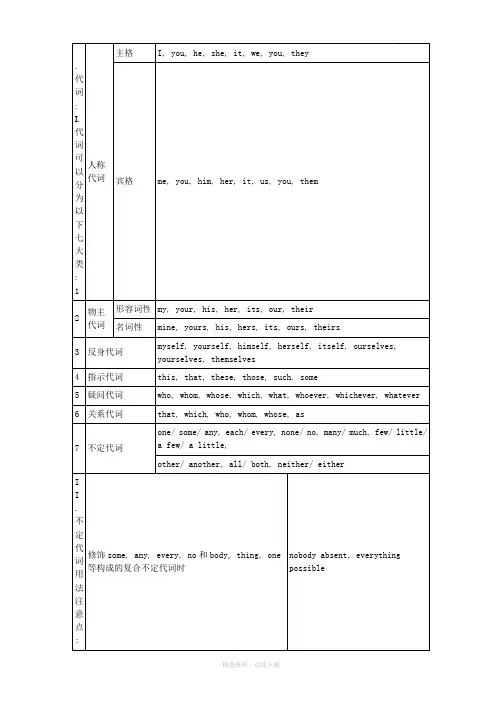
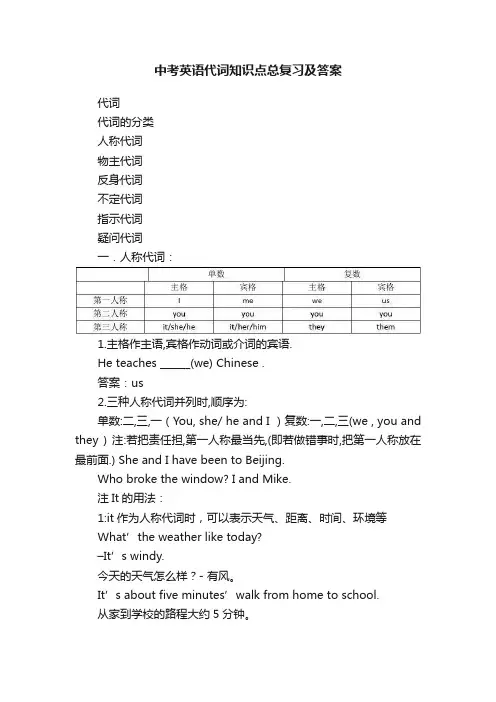
中考英语代词知识点总复习及答案代词代词的分类人称代词物主代词反身代词不定代词指示代词疑问代词一.人称代词:1.主格作主语,宾格作动词或介词的宾语.He teaches ______(we) Chinese .答案:us2.三种人称代词并列时,顺序为:单数:二,三,一(You, she/ he and I )复数:一,二,三(we , you and they ) 注:若把责任担,第一人称最当先,(即若做错事时,把第一人称放在最前面.) She and I have been to Beijing.Who broke the window? I and Mike.注It的用法:1:it作为人称代词时,可以表示天气、距离、时间、环境等What’the weather like today?–It’s windy.今天的天气怎么样?- 有风。
It’s about five minutes’walk from home to school.从家到学校的路程大约5分钟。
2. it 可指不知性别的婴儿或不确指性别的人.—who is the person over there?—It is the headteacher.1. --- Who is knocking at the door?--- I don’t know . I was lying in the bed and just ask who ____ was.A. heB. sheC. it2. I can’t find my hat . I don’t know where I put ____.A. oneB. itC. that3. I can’t find my hat . I think I must buy__.A. itB. oneC. that答案:CBB固定句型1. 做某事情对某人来说是…It is + adj. (+for sb.) +to do sth.It is hard for me to do this work.2. 轮到某人做…It’s one’s turn to do sth.It’s your turn to clean the room.3. 是(某人)做某事的时候了It’s time (for sb.) to do sth.It’s time for you to do the homework.4. 据说…It’s said that …It’s said that your teacher leave our school.5. 某人花费…做某事It takes sb. some time to do sth.6. 自从…以来,已经有…(时间)了。
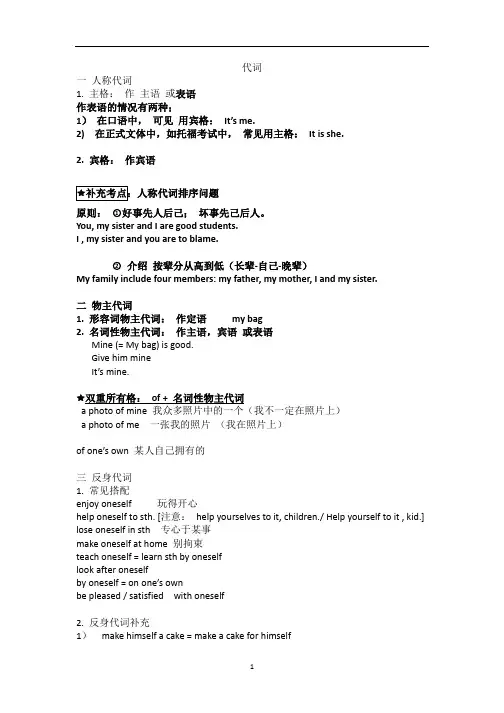
代词一人称代词1. 主格:作主语或表语作表语的情况有两种;1)在口语中,可见用宾格:It’s me.2) 在正式文体中,如托福考试中,常见用主格:It is she.2. 宾格:作宾语原则:○1好事先人后己;坏事先己后人。
You, my sister and I are good students.I , my sister and you are to blame.○2介绍按辈分从高到低(长辈-自己-晚辈)My family include four members: my father, my mother, I and my sister.二物主代词1. 形容词物主代词:作定语my bag2. 名词性物主代词:作主语,宾语或表语Mine (= My bag) is good.Give him mineIt’s mine.↓双重所有格:of + 名词性物主代词a photo of mine 我众多照片中的一个(我不一定在照片上)a photo of me 一张我的照片(我在照片上)of one’s own 某人自己拥有的三反身代词1. 常见搭配enjoy oneself 玩得开心help oneself to sth. [注意:help yourselves to it, children./ Help yourself to it , kid.] lose oneself in sth 专心于某事make oneself at home 别拘束teach oneself = learn sth by oneselflook after oneselfby oneself = on one’s ownbe pleased / satisfied with oneself2. 反身代词补充1)make himself a cake = make a cake for himself2) 强调用法:作同位语The president himself will chair the meeting.四指示代词1)this / these that / those在比较状语从句中,指代前文提及的对象。
1专题三:代词和数词一、代词是用于代替名词以及起名词作用的短语、分句或句子等。
一般分为人称代词、物主代词、指示代词、不定代词、反身代词几类。
1. 人称代词分为主格和宾格,通常主格作主语,宾格作宾语,__________后用宾格。
如果主语和宾语为同一个人或物,那么宾语用__________。
(反身代词不能放句首做主语) I like table tennis. (2.物主代词是表示所属关系的代词,分为形容词性物主代词和名词性物主代词。
形代相当于形容词,用于名词前,如He is my friend 。
名代相当于名词,只独立使用,如This is mine 。
3. 指示代词:这个_______ 那个________ 这些 _________ 那些 ___________ ① this 和these 一般指时间或空间上较近的人或事物,that 和those 一般较远。
② 有时that 和those 指前面讲到过的事物,this 和these 指下面将要讲到的事物,如 The weather in Beijing is much colder than ______ in Guangzhou in winter.③ 电话用语中,this 代表自己,that 代表对方,如Hello._____ is Mary. Who is _____? 4. 不定代词:①复合不定代词:something, somebody, anything, anybody, nothing, nobody 等与形容词搭配时,形容词放_________,如: 我学到了有用的东西。
I learned ______________________.②both _________ all __________ either _________ neither ___________ none_________ 如_______ Lucy and lily like salad. / These three boys ______ like Mr Pope.③the other __________, 用于__________之间。
初三的英语语法知识点总结归纳英语作为一门重要的学科,语法是其基础和核心内容。
在初三阶段,学生需要全面掌握英语语法知识,以便正确运用语言表达自己的思想和理解他人的意思。
本文将对初三英语语法知识点进行总结归纳,帮助同学们快速复习和强化记忆。
一、词类与词性1. 名词(Noun):表示人、物、地点、抽象概念等。
2. 代词(Pronoun):代替名词,分为人称代词、物主代词、反身代词等。
3. 形容词(Adjective):修饰名词或代词,描述属性或特征。
4. 副词(Adverb):修饰动词、形容词和其他副词,表示程度、方式、时间等。
5. 动词(Verb):表示动作、状态或存在。
6. 介词(Preposition):表示位置、方向、时间、关系等。
7. 连词(Conjunction):连接词语、短语、从句等。
8. 冠词(Article):限定名词的用法,分为不定冠词(a/an)和定冠词(the)。
二、句子结构与语法规则1. 陈述句(Declarative Sentence):陈述一个事实或观点,语序为主语+谓语+宾语/补语。
2. 疑问句(Interrogative Sentence):用于提问,语序为助动词/特殊疑问词+主语+谓语+宾语/补语。
3. 祈使句(Imperative Sentence):表达命令、请求、建议等,语序为谓语+宾语/补语。
4. 感叹句(Exclamatory Sentence):表达强烈的感情或意见,语序为"What/how+adj./adv.!"。
5. 主谓一致:主语与谓语之间在人称、数上保持一致。
6. 定语从句(Adjective Clause):用来修饰名词或代词的从句,引导词有关系代词和关系副词。
7. 状语从句(Adverbial Clause):修饰动词、形容词和副词的从句,包括时间、地点、条件、原因等。
三、时态与语态1. 一般现在时(Simple Present):表示经常性、习惯性或普遍真理,动词原形。
名词1、 名词的分类专有名词单数名词表泛指,在前面加a /an.可数名词:有单数和复数之分普通名词 复数形式通常加 -s/-es 不可数名词:没有复数形式 物质名词、抽象名词、专有名词 用some/any/a little/a lot of 修饰2) 不规则变化①有些名词以-s结尾,但表达单数意义。
科学名词:physics, mathematics/maths 游戏名称:bowls专有名词:the United States, Niagara Falls 其他名词:news, falls②名词做定语,不用复数形式.e.g. a shoe shop, an apple tree*例外:man, woman作定语时,如果后面的名词是复数,则man, woman也要变。
e.g. a woman teacher → three women teachersa man doctor → many men doctors③people, police做“人们”讲时,看作复数,不能在后面加”-s”,谓语动词用复数形式。
family, class是集体名词,既指单数,又指复数,谓语动词可用单数亦可用复数,具体根据语境而定。
④其前不用冠词a/an或数词,但可用much, a little, a lot of/lots of, some,—Look at the clouds, so beautiful!—Wow, so many different _______, horses, sheep, flowers…A. sizesB. shapesC. colorsD. stylesThere are some _______ in Dayton Art Museum. For example, n o food or drink is allowed inside.A. jobsB. recordsC. rul esD. paintings—Yesterday, my father bought me a new mobile phones as a pr esent, but I don’t know how to use it.—Why not read the _______ first before using it?A. expressionsB. applicationsC. adve rtisementsD. instructionsThese _________ have saved many children’s lives.A. woman doctorsB. women doctorC. women doctorsD. woman doctor---What would you like to drink, _______or orange? ---Orange, please.A. hamburgerB. chipC. tea3、不可数名词的数1) 可以修饰不可数名词的词或短语:a lot of , lots of, some, a little, little2) 数词+ 量词 + of + 不可数名词e.g. a glass of water → two glasses of watera cup of tea → three cups of tea3) 常用的不可数名词food, meat, fish, chicken, pork, beef, mutton, orange, milk, tea, coke, water, rice, bread, homework, news, paper, ice, rain, snow, wind, cloud, air, weather, maths, Chinese, English, music, information, fun, work 等.4) 有些不可数名词以复数形式出现时,意思有变化.5) 有些名词,既可以作可数名词,又能做不可数名词,但含义不同Exercises:—Mum, I’ve heard that we can’t eat ____ those days. Is it true?—Take it easy. It is safe to eat cooked meat.A. chickenB. chickensC. a chickenD. the chickenThe students of Grade 7 visited Mike’s farm and saw many ___ there.A. birdB. duckC. sheepD. rabbitI’m so hungry. Please give me ___ to eat.A. three breadB. three pieces of breadC. three pieces ofbreads D. three piece of breadI want a sweet milk. Put some ______ in my cup, please.A. iceB. soupC. saltD. sugar—What a good ______ you’ve given me! Thanks a lot.—My pleasure.A. informationB. newsC. suggestion D. advice4、名词的所有格分类构成方法例子表示有生命的名词所有格在单数后面加-’s The teacher’s officeLily’s photo 以加-s的复数名词后加“’”The teachers’ officeBoys’ games 不以-s 结尾的复数名词后加“-’s”The children’s palace.用and 连接两个并列的单数名词表示共有时,在后一个词尾加-’s;如果不是,则需要分别加在两个名词后面。
中考英语词汇之代词和数词代词和数词是中考英语词汇中的重要部分。
它们在句子中起到了连接词和数量表示的作用,对于学习英语的学生来说,掌握代词和数词的用法是很重要的。
本文将就代词和数词的分类和用法进行详细介绍。
一、代词的分类1. 人称代词人称代词用于代替特定的人或物。
根据人称代词所代替的人或物的位置不同,人称代词又可分为主格、宾格、所有格和反身代词四种形式。
主格人称代词用来作为句子的主语,例如:“I am a student.”(我是学生)。
宾格人称代词用来作为句子的宾语,例如:“She gave me a present.”(她给了我一个礼物)。
所有格人称代词用来表示所属关系,例如:“This is my book.”(这是我的书)。
反身代词用来表示主语和宾语的一致,例如:“He hurt himself.”(他伤害了自己)。
2. 物主代词物主代词用来表示名词所有者的身份,例如:“This is her book.”(这是她的书)。
物主代词的形式包括我的(my)、你的(your)、他的(his)、她的(her)、它的(its)、我们的(our)、你们的(your)、他们的(their)。
3. 反身代词反身代词用来表示主语和宾语是同一人或物,例如:“We can take care of ourselves.”(我们可以照顾好自己)。
反身代词的形式包括myself、yourself、himself、herself、itself、ourselves、yourselves、themselves。
4. 指示代词指示代词用来指示特定的人或物,例如:“This is my pencil.”(这是我的铅笔)。
指示代词的形式包括this、that、these、those。
5. 疑问代词疑问代词用来引导疑问句,用来询问特定的人或物,例如:“Which book do you want?”(你想要哪本书?)。
疑问代词的形式包括who、whom、whose、which、what。
初中中考英语必考知识点总结一、语法部分。
1. 名词。
- 可数名词与不可数名词的区分。
例如:paper(纸,不可数),book(书,可数)。
可数名词有单复数形式,复数形式的变化规则有:- 一般情况加 -s,如book - books。
- 以s、x、ch、sh结尾的加 -es,如box - boxes,watch - watches。
- 以辅音字母 + y结尾的,变y为i加 -es,如city - cities;以元音字母 + y结尾的,直接加 -s,如day - days。
- 以f或fe结尾的,有些变f或fe为v加 -es,如knife - knives,leaf - leaves;有些直接加 -s,如roof - roofs。
- 名词所有格。
- 有生命的名词所有格:一般在名词后加's,如Tom's book;以s结尾的复数名词加',如the students' classroom。
- 表示两者共同拥有时,只在最后一个名词后加's,如Lucy and Lily's mother (露西和莉莉的妈妈,两人共有的妈妈);表示各自拥有时,在每个名词后都加's,如Lucy's and Lily's bags(露西的包和莉莉的包,各自的包)。
2. 代词。
- 人称代词主格(I、you、he、she、it、we、you、they)和宾格(me、you、him、her、it、us、you、them)的用法。
主格在句中作主语,宾格作宾语。
例如:He helps me.(he作主语,me作宾语)- 物主代词分为形容词性物主代词(my、your、his、her、its、our、your、their)和名词性物主代词(mine、yours、his、hers、its、ours、yours、theirs)。
形容词性物主代词后面要接名词,名词性物主代词相当于名词,可以单独使用。
史上最全的中考英语语法必考知识点汇总一、词类、句子成分和构词法:1、词类:英语词类分十种:名词、形容词、代词、数词、冠词、动词、副词、介词、连词、感叹词。
1、名词(n.):表示人、事物、地点或抽象概念的名称。
如:boy, morning, bag, ball, class, orange.2、代词(pron.):主要用来代替名词。
如:who, she, you, it .3、形容词(adj..):表示人或事物的性质或特征。
如:good, right, white, orange .4、数词(num.):表示数目或事物的顺序。
如:one, two, three,first, second, third, fourth.5、动词(v.):表示动作或状态。
如:am, is,are,have,see .6、副词(adv.):修饰动词、形容词或其他副词,说明时间、地点、程度等。
如:now, very, here, often, quietly, slowly.7、冠词(art..):用在名词前,帮助说明名词。
如:a, an, the.8、介词(prep.):表示它后面的名词或代词与其他句子成分的关系。
如in, on, from, above, behind.9、连词(conj.):用来连接词、短语或句子。
如and, but, before .10、感叹词(interj..)表示喜、怒、哀、乐等感情。
如:oh, well, hi, hello.2、句子成分:英语句子成分分为七种:主语、谓语、宾语、定语、状语、表语、宾语补足语。
1、主语是句子所要说的人或事物,回答是“谁”或者“什么”。
通常用名词或代词担任。
如:I’m Miss Green.(我是格林小姐)2、谓语动词说明主语的动作或状态,回答“做(什么)”。
主要由动词担任。
如:Jack cleans the room every day. (杰克每天打扫房间)3、表语在系动词之后,说明主语的身份或特征,回答是“什么”或者“怎么样”。
初三英语中考专题复习
第一节代词数词
( ) 1. Students are usually interested in sports. Some like running, some like swimming, _______ like ball games.
A. the others
B. others
C. the other
D. other
( ) 2. _______ of the two girls is from Beijing.
A. All
B. Both
C. None
D. Neither
( ) 3. The weather in summer here is like _______ in Beijing.
A. this
B. that
C. it
D. its
( ) 4. The room on the right is _______.
A. her
B. she
C. Lucy’s
D. Lucy
( ) 5. Where are the students? Are they in _______?
A. the Room 406
B. Room 406
C. the 406 Room
D. 406 Room
( ) 6. There are ________ people in the factory now.
A. thousand of
B. two thousands
C. thousands of
D. thousand
( ) 7. The man over there is my brother. _______ is a doctor.
A. She
B. He
C. Hers
D. His
( ) 8. I have two cats. One is black, and _______ is white.
A. another
B. some
C. other
D. the other
( ) 9. I’m looking for a babysister (保姆). She must be ________ too old ________ too young.
A. neither; nor
B. both; and
C. either; or
D. not only; but also ( ) 10. –What’s in your car? -- _______.
A. No one
B. Nothing
C. Nobody
D. None
( ) 11. There are quite a few old books on the shelf, but _______ of them is useful to him.
A. both
B. all
C. neither
D. none
( ) 12. –I’ve had enough bread. Would you like ________? --No, thanks.
A. a few more
B. one more
C. another more
D. some more ( ) 13. The film star is going to spend ________ dollars on a new dress for the coming party.
A. three thousands
B. thousands of
C. thousand of
D. three thousands of ( ) 14. –Did Eric buy any vegetables in the market?
-- No, he didn’t, but he thought _______ fish.
A. no
B. any
C. some
D. both
( ) 15. It is said that SARS has killed more than ________ people worldwide.
A. three hundreds
B. three hundreds’
C. three hundred’s
D. three hundred ( ) 16. If you want a ticket for a round-trip, sir, you’ll have to pay ________ $8o.
A. another
B. other
C. each
D. more
( ) 17. The place is not interesting at all. ________ of us wants to go there.
A. Neither
B. Both
C. All
D. Some
( ) 18. Both of the two rulers are broken. I want to buy a ________one.
A. three
B. third
C. forth
D. /
( ) 19. I heard the sports meeting has been put off until _______, hasn’t it?
A. the 3 and 4
B. the 3th and 4th
C. the 3rd and 4th
D. four and five ( ) 20. _______ of the earth _______ made up of oceans.
A. Two-third; is
B. Two-thirds; is
C. Two-third; are
D. Two-thirds; are ( ) 21. Most of us don’t know _______ about how life is formed.
A. many
B. little
C. few
D. much
( ) 22. –Is this short-wave radio _______? --No. it belongs to _______.
A. yours; me
B. yours; his
C. her; him
D. yours; her ( ) 23. –Have you got any books on music? I want to borrow _______.
--Yes. You can find them on the top shelf of the second bookcase.
A. it
B. any
C. one
D. them
( ) 24. –Have you read the paper?
--Yes, but I don’t think there’s _______ new in it.
A. something
B. nothing
C. anything
D. everything ( ) 25. Since 1964, _______ satellites have been sent into space.
A. dozens of
B. four dozens
C. dozen of
D. several dozens ( ) 26. _______ of the two boys are clever enough to work out the problem.
A. Either
B. Both
C. Some
D. Many
( ) 27. –Who has been to Hawaii? -- _______ has.
A. No one
B. I
C. All of us
D. None
( ) 28. Jack Booth is a _______ man.
A. 21-years-old
B. 21 years old
C. 21-year-old
D. 21 year old ( ) 29. I’ve lived here for about _______.
A. two and a half year
B. two and a half years
C. two year and a half
D. two years and half
( ) 30. The book on the desk is newer than _______ in the desk.
A. the one
B. that
C. the ones
D. those
( ) 31. In our class, _______ has a dictionary.
A. all of us
B. each of us
C. some of us
D. every of us。